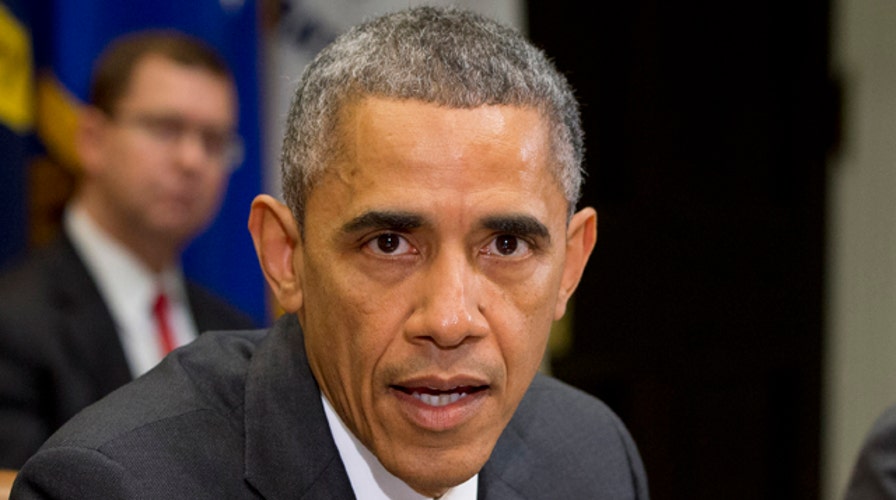This is a rush transcript from "Special Report," December 18, 2014. This copy may not be in its final form and may be updated.
(BEGIN VIDEO CLIP)
ED HENRY, FOX NEWS WHITE HOUSE CORRESPONDENT: He is using a lot more executive action than his predecessors, right?
JOSH EARNEST, WHITE HOUSE PRESS SECRETARY: Well, I think there is no doubt that the president has sought to use his executive authority to move this country forward within the confines of the law, oftentimes in the face of congressional inaction. That I wouldn't disagree with.
HENRY: But why did he make this public claim that there is criticism that I'm acting on executive basis and I'm doing that, you know, less -- the lowest level in 100 years. That wasn't really true, right?
EARNEST: It was true because the number of executive orders that this president has issued is lower, as you pointed out, than executive orders that have issued by many of his previous predecessors.
(END VIDEO CLIP)
BRET BAIER, ANCHOR: Well, that's a lie. The administration, Democrats saying he has issued far fewer executive orders than any two term president in the last 50 years. Well, when you look at the stats, yes, that is true. It is far fewer executive orders in the blue. But when you add up the executive memoranda, it's 195 orders and 198 memoranda. We're back with the panel. Judge, I mean, this immigration action was not specifically an executive order. It was a bunch of memos that told agencies what to do and not to.
JUDGE ANDREW NAPOLITANO, FOX NEWS SENIOR JUDICIAL ANALYST: Key phrase in what Josh Earnest just is said to our Ed Henry, "within the limits of the law." The immigration orders that he issued, whether he calls them executive orders or executive memoranda, a rose by any other name would smell as sweet, he can call it what he wants, were not within the limits of the law. He neutered the law and he made up the law. He basically said I will tell you how to avoid deportation if you do a, b, c, d, and e, and he made up the a, b, c, d, and e.
With respect to Cuba, however, with respect to reestablishing foreign relations with that country, normal diplomatic relations, whether you like that idea or not, the courts have been very clear that is exclusively within the province of the president.
BAIER: Sure. But he cannot lift the embargo by himself.
NAPOLITANO: He probably thinks he can or wishes he could, but he absolutely cannot. If he tries to tinker with that that's a statute that Congress enacted.
BAIER: It's interesting, Mara, two different parties look at the next poll, how is government working, two different ways. Best describes your feeling on how the federal government is working -- broken, 65 percent, 29 percent, just OK, pretty well, five percent. The Democrats say well, this is why the president has to issue the executive orders and executive actions. The Republicans say no, these people want us back to a constitutional following the rules and Congress plays a part.
MARA LIASSON, NATIONAL PUBLIC RADIO: Well, I think that what people want, and we saw this in the exit polls in the election, people want the government to function. They want both parties to work together and they want them to compromise on things. Now it's interesting in that bar graph you put up before, he has issued more executive memorandum than think other presidents. But still the bar in total for executive actions and memorandum is still below other presidents, including Jimmy Carter. So he still has a ways to go. But of course he has two years left and he is planning to be very, very busy.
But he has not made a secret of this. They have said over and over again, we are going to do everything we can with every power that we see he legally has to do as much as he can. And that's what he is doing. And Cuba was no different.
CHARLES KRAUTHAMMER, SYNDICATED COLUMNIST: Look, this is quite clear. The president came in as an extremely ideologically ambitious man. He said he was going to change America. He was very open about it. First State of the Union address he talked about changing education, energy, health care. He succeeded in Congress with health care. He did not succeed with anything else. Cap and trade did not succeed.
He loses the House, which means he loses control. He has no chance of enacting anything sweeping again after health care. And he decides he's going to spend the next six years trying to get his agenda enacted by executive order, which is why he oversteps everywhere. And when you say it's not -- the federal government isn't working, what's the definition of working? Sweeping change of our immigration laws in a country that has not decided how it wants to actually do that? It's working exactly as designed where the power of the president is checked, and what Obama is doing is destroying that balance.
BAIER: And Judge, it's going to be challenged in court.
NAPOLITANO: Absolutely going to be challenged in court.
BAIER: All right, judge. Thank you. Panel, thank you. That's it for the panel, but stay tuned for a look at White House holiday celebrations.
Content and Programming Copyright 2014 Fox News Network, LLC. ALL RIGHTS RESERVED. Copyright 2014 CQ-Roll Call, Inc. All materials herein are protected by United States copyright law and may not be reproduced, distributed, transmitted, displayed, published or broadcast without the prior written permission of CQ-Roll Call. You may not alter or remove any trademark, copyright or other notice from copies of the content.

